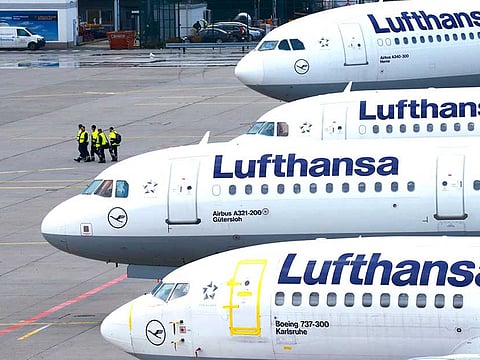Lufthansa's Debt priorities mean taking fewer Airbus planes
Airline had 198 aircraft on order at year-end, of which 156 were for Airbus jets.

Also In This Package
Frankfurt: Deutsche Lufthansa AG is unlikely to take delivery of all 80 of the jets it's allowed to accept through 2023 under terms of a 9 billion-euro ($10.3 billion) government bailout, according to a person familiar with the matter.
The German airline will instead prioritize quick repayment of the aid, said the person, who asked not to be identified discussing confidential matters. While the plans are in flux and depend on the pace of a travel recovery, any shortfall would be a setback for Airbus SE. The European planemaker, also partly owned by Germany, is Lufthansa's most important supplier and lobbied for stronger assurances that the airline would keep up plane deliveries, people familiar with the matter said.
The tension over orders shines a light onto the inner workings of one of Europe's biggest airline bailouts, and the pressures that shaped decisionmaking on a drawn-out, white-knuckle process. When the coronavirus outbreak slammed air travel, airlines like Lufthansa - Europe's biggest - saw revenue abruptly cut off and quickly descended into financial shock. The crisis soon rippled down to airframers Airbus and rival Boeing Co. as carriers sought to delay or cancel orders.
With direct aid to Airbus politically sensitive because of ongoing trade disputes with the U.S., its biggest shareholders, the governments of France and Germany prioritized propping up their national carriers, Air France-KLM and Lufthansa. By design, some of that money would flow through to suppliers like Airbus.
Plane Deliveries
Lufthansa had 198 aircraft on order at year-end, of which 156 were for Airbus jets. During discussions on the airline's rescue financing, the planemaker's chief executive officer, Guillaume Faury, pressed his Lufthansa counterpart Carsten Spohr to take all Airbus aircraft on order through 2023, the people said. The German government acted as mediator, they said, resulting in a compromise memorialized in the aid package: Lufthansa would not cancel any aircraft orders, while it would accept a maximum of 80 aircraft during the period.
The airline elaborated earlier this month, setting a goal to halve spending on new aircraft through 2023. About three-fourths of those planes are from Airbus, principally its A320neo family of single-aisle workhorses and the modern A350 wide-body. Overall, the German airline group has about $23 billion in Airbus planes on order, before customary industry discounts.
"Airbus certainly would have liked to use the bailout package for Lufthansa to ensure delivery of most the aircraft," said Daniel Roeska, an analyst with Sanford C. Bernstein. "But that would have put management in a tight corner and may even have raised concerns with the European Commission," which monitors competition.
An Airbus spokesman declined to comment, pointing out Faury's comments in a June 29 interview in Die Welt. In it he said that while he would like Lufthansa to order from Airbus as it has in the past, "there has to be competition."
Lufthansa spokesman Helmut Tolksdorf declined to comment beyond the conditions of the aid package that are public.
The German Economy Ministry declines to comment.
Interest Hike
While Lufthansa committed through the aid package to continue rejuvenating its fleet to lower carbon emissions, the pressure to hold off on deliveries and use the money for repayments is immense. The airline has already said it will retire some 100 of its more than 760 planes, while demand for air travel is likely to remain depressed for some years.
At the same time, Lufthansa's interest payments are scheduled to skyrocket with the extra debt. The rate on much of the funding more than doubles to 9.5% in 2027 from 4% in the first year.
"Realistically, Lufthansa will not need any new jets over the next four years," Roeska said. "Investors would rather see them buying no planes at all for some years and use the funds to delever the balance sheet."
French Aid
France, meanwhile, last month said it would spend some 15 billion euros to safeguard aviation-industry jobs. French finance minister Bruno Le Maire has called on Air France-KLM to be a "good customer" of Airbus, making clear what is expected of the airline following a total of 10.4 billion euros in aid from France and the Netherlands, while avoiding to spell out more specific demands.
Even so, the French airline group has said it will delay entry into service of some Airbus A350 and Boeing 787s. It could could pull some additional wide-body aircraft if needed, Chief Executive Officer Ben Smith said in May.
Germany has promised not to interfere with Lufthansa's corporate strategy, and that could potentially tip the balance in favor of debt service over spending on the fleet. Still, the aid package includes a veto right for certain corporate decisions, leaving the door open for political influence.
"The trouble between Airbus and Lufthansa will start if demand remains subdued and Lufthansa will try to push out those deliveries further and further," said Roeska. "It will take Lufthansa a decade to get over this crisis."
Sign up for the Daily Briefing
Get the latest news and updates straight to your inbox









